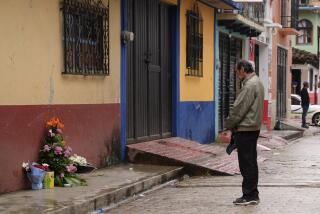Bishop Eulogized for Goal of ‘Peace Not Based on Lies’
GUATEMALA CITY — Roman Catholic Bishop Juan Jose Gerardi was buried Wednesday in a ceremony that served to remind all of Central America of the perils of trying to discover the truth about its war-torn past.
Gerardi, 75, was brutally killed Sunday, two days after he released a detailed study of human rights violations during Guatemala’s 35-year civil war. Begun even before a peace agreement was signed in December 1996, the report sought to lay to rest the ghosts of Guatemala’s history in a way that other Central American nations, whose U.S.-backed civil wars ended earlier, have been unable to do.
In the weeks before Gerardi’s head was bashed in with a triangle of concrete, neighboring El Salvador was stirred by new developments in the ambush killing 18 years ago of four U.S. religious women.
In Nicaragua, President Arnoldo Aleman has yet to fulfill a campaign promise to create a truth commission to find out what really happened in the fighting between the Marxist Sandinista government that ruled in the 1980s and the Contras funded by the United States.
Even in peacetime, the truth would appear to be a dangerous commodity in Central America.
“He struggled for reconciliation, for a true peace not based on lies, for peace based on justice and truth,” Bishop Gerardo Flores told about 10,000 mourners who crowded the Metropolitan Cathedral here and spilled onto the main plaza.
“His struggle for life could not satisfy those who did not mind killing in order to maintain the positions they attained dishonestly, and for that they killed him,” Flores told mourners.
A clear motive for the killing has not yet been established, and no suspects have been arrested.
Guatemala has a history of political killings that are initially blamed on common crime. The most well-known is that of Guatemalan anthropologist Myrna Mack, who was stabbed in 1990, a few days after she published a study on war refugees.
The killing was attributed to street crime until Mack’s sister, Hellen, undertook her own investigation and forced authorities to reopen the case, leading to the conviction of a soldier. A special prosecutor continues efforts to convict the suspected masterminds--high-ranking military officials.
In Gerardi’s case, the Guatemalan government is under increasing international pressure to solve the killing and has asked for help. A team of FBI agents began to arrive Wednesday.
About 50 modestly dressed people gathered outside the Guatemalan Embassy in San Salvador on Wednesday to demand that Gerardi’s slaying not remain among the scores of unsolved Central American assassinations.
Salvadorans have struggled to find their own answers in the six years since a peace agreement was signed between their U.S.-backed right-wing government and Marxist guerrillas. A United Nations truth commission, under pressure to finish rapidly, in 1993 produced a study that clarifies many high-profile slayings and massacres.
But in many cases, the proven accusations do not reach beyond the triggermen and barely implicate the high-level masterminds. As a result, Salvadoran society is repeatedly polarized by new revelations about old crimes. This month, four soldiers convicted of killing the four U.S. religious women in 1980 said they had been told that the order for the murders came from higher up.
Eight years after democratic elections ended Nicaragua’s civil war, that country is still dotted with clandestine graveyards that hide the bones of civilian war victims. Immediately after taking office last year, Aleman appointed a commission of distinguished Nicaraguans, whom he asked to clarify war crimes. But the panel never took action. Aleman has since named a mixed government-civic commission that is expected to begin work as soon as a staff can be hired, according to government sources.
Besides the church study, Guatemala will also have a U.N. truth commission report. But under terms of this nation’s peace agreement, the U.N. report, due for release in July, will not name names.
More to Read
Sign up for Essential California
The most important California stories and recommendations in your inbox every morning.
You may occasionally receive promotional content from the Los Angeles Times.










